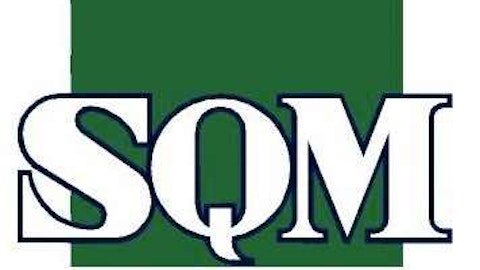
But fortunately for Best Buy Co., Inc. (NYSE:BBY)’s shareholders, this strategy could work much better for an electronics retailer than for a department store.
Best Buy’s Samsung Experience shops
During the earnings call, Best Buy Co., Inc. (NYSE:BBY)’s management took the opportunity to highlight its partnership with Samsung. So far, Best Buy has rolled out over 500 Samsung Experience shops, and more will be coming soon.
The “shops” are small sections within the larger Best Buy store occupying a few hundred feet. They are composed of a number of tables with Samsung’s various products on display — its Galaxy devices, its Ultrabooks — and a counter similar to the Genius Bar found in every Apple Inc. (NASDAQ:AAPL) store.
In effect, it’s really a way for Samsung to replicate Apple Inc. (NASDAQ:AAPL)’s retail strategy. And because it’s using Best Buy’s existing real estate, it was a way to roll out hundreds of “stores” in just a few months.
The advantages of Apple’s retail strategy
Given the abysmal financial state of J.C. Penney Company, Inc. (NYSE:JCP), Ron Johnson’s ideas may not seem that great today. But at Apple, his retail operation contributed much to the company’s meteoric rise.
Some commentators have dismissed Johnson’s contribution to the Apple story, arguing that Apple’s products were so good, they could be sold in a dirty alley.
While that may be the case, having dedicated retail shops offers Apple Inc. (NASDAQ:AAPL) tremendous value. They serve as a gathering place, one where customers can come to try out products, learn how to use them, and get instant on-site technical support.
In years long past, Dell Inc. (NASDAQ:DELL)’s technical support was the butt of many jokes — someone calling Dell Inc. (NASDAQ:DELL) for help would inevitably be forced into a lengthy and confusing phone call with a rep sporting a thick accent.
But when you own an Apple device, getting technical support is a comparatively pleasant experience — it requires just a quick trip to the local store.
Best Buy’s future partners
Critics of Samsung frequently allege that the company has done little more than copy Apple’s ideas. Certainly, its Galaxy lineup of phones and tablets are similar to Apple’s own products, but if it was going to truly replicate the Cupertino tech giant’s business model, it needed dedicated shops. Enter Best Buy Co., Inc. (NYSE:BBY).
But in chasing Apple, Samsung has gained an unfair advantage against its other rivals. HTC, for example, has been aggressively coming after Samsung — its HTC One handset has been dubbed by several reviewers as superior to Samsung’s rival Galaxy S4.
Yet, if HTC really wants to compete with Samsung, shouldn’t it follow with its own Best Buy Co., Inc. (NYSE:BBY) shops? Those could certainly be coming.
On Best Buy’s earnings call, CEO Hubert Joly hinted at just that possibility:
“So this is a very positive thing. If anything the announcement of Samsung and the deployment of Samsung has triggered more competitions with other vendors who are agreeing that this is a very positive. And the more traffic is attracted to our stores, the better this is for everybody. So there will be more – there’s nothing to talk about today, but we are interested in doing more and we see it as win-win-win.”
In short, if Best Buy Co., Inc. (NYSE:BBY) were to announce more shops in the coming months — perhaps deals with HTC, Sony Corporation (ADR) (NYSE:SNE), or LG — investors shouldn’t be surprised.
The difference between electronics and clothing
But didn’t this boutique model fail when Johnson tried it at J.C. Penney Company, Inc. (NYSE:JCP)? Why would it work for Best Buy?
Fundamentally, the shopping experience is vastly different between clothing and electronics. To some extent, the boutique model can actually be detrimental when it comes to shopping for clothes. A consumer looking for a pair of jeans, for example, must run from one mini-shop to the next, comparing different brands’ offerings.
Increasingly, that isn’t true when it comes to electronics. The rise of the ecosystem has meant that shoppers are choosing to commit to a brand, rather than buy an individual product. That is to say, someone who has an iPhone may get more utility from buying an iPad in place of a rival tablet.
There’s also a bit more brand loyalty among buyers of high-end electronics, as compared to clothing, particularly among the budget-conscious consumers J.C. Penney Company, Inc. (NYSE:JCP) generally appeals to.
Best Buy becoming a landlord?
Best Buy seems pleased with its Samsung Experience shops, and given the comments management has made, more deals with other companies could be on the way.
Soon, Best Buy Co., Inc. (NYSE:BBY) could find itself transforming into a quasi-landlord; a provider of space for individual brands, rather than a simple big-box store.
Back in February, I had written that I believed Best Buy was destined for bankruptcy. I hold that opinion no longer. By providing its assets (retail space) to brands eager to replicate Apple’s retail strategy, Best Buy should wind up with a new lease on life.
The article Best Buy Seems Poised to Embrace J.C. Penney’s Failed Strategy originally appeared on Fool.com and is written by Salvatore “Sam” Mattera.
Joe Kurtz owns shares of J.C. Penney. The Motley Fool recommends Apple. The Motley Fool owns shares of Apple. Salvatore “Sam” is a member of The Motley Fool Blog Network — entries represent the personal opinion of the blogger and are not formally edited.
Copyright © 1995 – 2013 The Motley Fool, LLC. All rights reserved. The Motley Fool has a disclosure policy.



